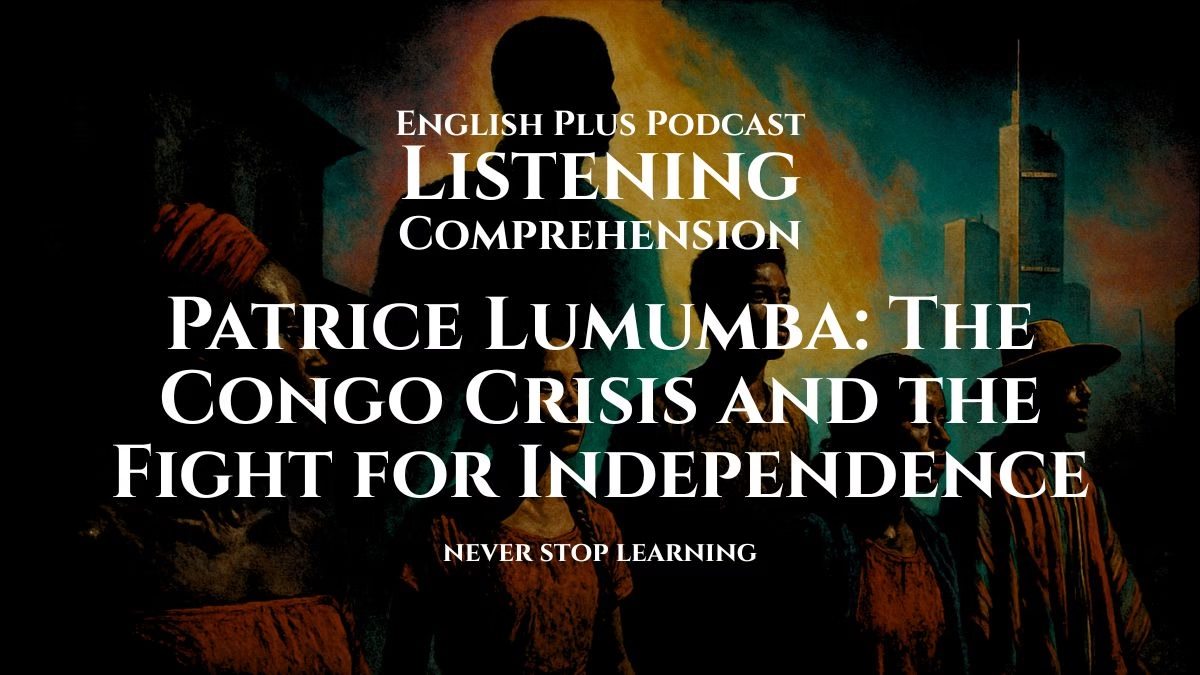Listening Skills for Exam Success
Welcome to this listening practice session. The lecture you are about to hear is typical of what you might encounter in an academic setting or on an international exam. It’s a monologue—one person speaking at length—which requires a specific set of skills.
Here are a few tips to maximize your practice:
- Anticipate the Content: Before you listen, read the topic title and the brief introduction below. Ask yourself: What do I already know about this? What words do I expect to hear? This “primes” your brain to catch key information.
- Listen for Structure, Not Just Words: In a 1500-word lecture, you cannot memorize every detail. Instead, listen for the structure. The speaker will use “signpost” words to guide you. Listen for cues like, “First,” “However,” “As a result,” or “The most significant factor was…” These signal a new idea, a contrast, or a conclusion.
- Practice Strategic Note-Taking: Don’t try to write full sentences. Focus on capturing the main ideas. Use abbreviations (e.g., PL for Patrice Lumumba, K for Katanga, CW for Cold War), symbols ($\to$ for ‘led to’, $\neq$ for ‘conflict’), and indentations to show which ideas are main points and which are supporting details.
- Infer the Speaker’s Purpose: Ask why the speaker is saying something. Are they giving an example? Are they drawing a conclusion? Understanding the purpose often unlocks the main idea of a section.
This exercise is designed to test your ability to understand a complex narrative, identify cause-and-effect relationships, and grasp the main arguments of an academic talk.
Topic Introduction
You are about to hear a university lecture about a pivotal moment in 20th-century history: the birth of the Democratic Republic of Congo. The story centers on its first democratically elected Prime Minister, Patrice Lumumba.
As you prepare to listen, think about the challenges a new nation might face, especially one emerging from a difficult colonial past. What happens when internal divisions meet external pressures, like the global Cold War?
Key Vocabulary and Phrases
Here are 12 advanced terms from the lecture. Understanding them is key to understanding the talk.
Tumultuous (adj.): Full of confusion, disorder, or conflict.
How it’s used: The speaker describes the Congo’s transition to independence as one of the most tumultuous periods of decolonization, highlighting the chaos and violence that erupted.
Nascent (adj.): Just coming into existence and beginning to show signs of future potential; new.
How it’s used: The lecturer refers to the “struggles of this nascent African nation,” meaning the country was brand new and its systems were not yet fully formed.
Paternalism (n.): A policy of limiting a group’s liberty or autonomy, supposedly for their own good (like a father—pater—limits a child).
How it’s used: Belgian rule is described as “aggressive paternalism,” meaning they treated the Congolese people as children incapable of self-rule, which justified their control.
Autonomy (n.): The right or condition of self-government; independence in one’s actions.
How it’s used: The speaker notes that some Congolese leaders, unlike Lumumba, wanted greater regional autonomy, meaning they wanted the provinces to have more self-governing power.
Charismatic (adj.): Having a compelling charm that inspires devotion in others.
How it’s used: Lumumba is described as a “charismatic… and uncompromising leader,” explaining his ability to rally large crowds and inspire loyalty.
Uncompromising (adj.): Unwilling or unable to change one’s views or behavior; inflexible.
How it’s used: This word is also used for Lumumba. His uncompromising stance on a unified Congo made him a powerful nationalist but also a difficult figure for his political rivals and Western powers to negotiate with.
Sovereignty (n.): The supreme authority within a territory; the status of being an independent state.
How it’s used: When Belgian troops re-entered the Congo after independence, the speaker calls it a “violation of the new nation’s sovereignty,” as it undermined their right to rule themselves.
Secession (n.): The act of formally withdrawing from a federation or body, especially a political state.
How it’s used: The lecture’s central crisis point is the “secession of Katanga,” meaning the province declared it was breaking away from the rest of the Congo.
Geopolitical (adj.): Relating to politics, especially international relations, as influenced by geographical factors and power dynamics.
How it’s used: The Congo crisis became a “geopolitical flashpoint,” meaning it wasn’t just a local civil war; it became a proxy battleground for global powers (the USA and USSR).
Puppet regime (n.): A government that appears independent but is actually controlled by an outside power.
How it’s used: The lecturer explains that the US feared Lumumba would install a “Soviet puppet regime,” a government secretly controlled by Moscow.
Mandate (n.): The authority given to an organization or person to carry out a particular task.
How it’s used: The UN peacekeeping force had a “confusing and weak mandate,” meaning their orders were unclear about whether they were allowed to use force to end the secessions.
Complicity (n.): The state of being involved with others in an illegal or wrongful act.
How it’s used: The speaker concludes by mentioning the “complicity of Belgian officers” in Lumumba’s murder, meaning they were involved in or accessories to the crime.
Listening Audio
Listening Transcript: Please do not read the transcript before you listen and answer the questions.
Today, we turn our attention to one of the most critical and tragic episodes of the decolonization era: the Congo Crisis of 1960 to 1961. This period marks the birth of the modern Democratic Republic of Congo, but it is also the story of its first elected leader, Patrice Lumumba, and the convergence of forces that led to his assassination.
To understand the “how and why” of this crisis, we cannot simply look at the events of 1960. We must first understand the foundation upon which this new nation was built. The territory, known as the Belgian Congo, was not a typical colony. It began as the personal property of one man, King Leopold II of Belgium. His rule, from 1885 to 1908, was a reign of terror, an exploitative enterprise of rubber and ivory extraction so brutal it led to the deaths of millions. When the Belgian state took formal control in 1908, the overt brutality subsided but was replaced by a system of aggressive paternalism.
Belgium’s “civilizing mission” was built on the premise that the Congolese were children, incapable of self-rule. Unlike British or French colonies, Belgium made almost no effort to create an educated native elite. When independence arrived in 1960, the vast nation—the size of Western Europe—had fewer than thirty Congolese university graduates. There were no Congolese army officers, no engineers, no doctors in high positions. The country was, by design, utterly unprepared for self-governance.
Into this vacuum stepped Patrice Lumumba. He was a former postal clerk and beer salesman, a self-educated intellectual who possessed a rare and potent combination of skills. He was a charismatic, dynamic, and uncompromising leader. He was not a tribal chief; he was a nationalist. His political party, the Mouvement National Congolais (MNC), was the only one that sought a unitary state. While his rivals, like Joseph Kasa-Vubu, advocated for a federal system that gave power to regions—regions often aligned with ethnic groups—Lumumba argued that a strong, centralized government was the only way to prevent the vast country from fracturing.
His pan-Africanist, anti-colonial rhetoric resonated powerfully with the masses. He won the election and, in a coalition government, became the Congo’s first Prime Minister. His rival, Kasa-Vubu, became the ceremonial President.
The date is June 30th, 1960. Independence Day. The tension is immediate. The Belgian King, Baudouin, gives a speech praising the “genius” of his ancestor, King Leopold II, and casting independence as the culmination of Belgium’s noble work. The speech is a masterpiece of condescension. The Congolese delegation is stunned into silence. Then, Patrice Lumumba, who was not scheduled to speak, takes the podium.
His speech is one of the most famous in 20th-century history. It was a direct, fiery, and emotional refutation of the Belgian narrative. He spoke not of Belgian gifts, but of Congolese suffering. He spoke of “the tears, the fire, and the blood” of colonization. He declared that the Congo’s independence was not given, it was taken—”a struggle of which we are the only ones who know the weariness and the pain.”
To his people, it was a declaration of true freedom. But to the Western representatives in the room—the Belgians, the Americans—it was an alarming signal. This was not the compliant, grateful post-colonial leader they had expected. This was a radical.
The new nation’s stability lasted five days.
The “how” of the collapse begins with the army, the Force Publique. It was still commanded entirely by Belgian officers who had no respect for the new government. When the Congolese soldiers mutinied, demanding pay raises and the removal of their white commanders, the country dissolved into chaos. Belgian civilians fled, and Belgium, seeing its interests threatened, made a fateful decision. Claiming it needed to protect its citizens, the Belgian government flew paratroopers back into the Congo—a complete violation of the new nation’s sovereignty.
This action provided the exact cover Lumumba’s internal enemies needed. Just eleven days after independence, the leader of the resource-rich province of Katanga, Moïse Tshombe, announced its secession. This was no local squabble. Katanga was, and is, the source of the Congo’s immense mineral wealth—copper, cobalt, and uranium. Tshombe’s secession was openly supported by Belgian business interests, particularly the powerful mining company Union Minière, which had no intention of letting its profits fall into the hands of a nationalist like Lumumba. A few weeks later, the diamond-rich province of South Kasai also seceded.
Lumumba’s nascent government now faced a catastrophe. He had lost control of his army, his country was fracturing, and his former colonial master had re-invaded.
This is where the “why” of the crisis—the external forces—takes center stage. Lumumba first appealed to the United Nations for help. He demanded that the UN use its peacekeeping forces to expel the Belgian troops and, crucially, to militarily crush the secessionist movements and restore the country’s unity.
The UN, under Secretary-General Dag Hammarskjöld, did send a peacekeeping force, ONUC. But it came with a confusing and weak mandate. The UN was willing to help maintain order and replace the Belgian troops, but it was not willing to get involved in an internal political dispute. It would not, in short, fight Katanga for Lumumba.
To Lumumba, this was a profound betrayal. He saw the UN, and by extension the West, as siding with the Belgian-backed secessionists. He held furious, public denunciations of the UN’s inaction. He grew desperate. If the West would not help him save his country, he would turn to the East.
This was the single most defining pivot of the crisis. In September 1960, Lumumba asked the Soviet Union for “technical assistance”—trucks, planes, and equipment—to transport his own troops to fight the secessions.
We must remember the year: 1960. This is the absolute peak of the Cold War. In Washington, President Eisenhower and his CIA director, Allen Dulles, saw the world in black and white: you were with them, or you were with the Soviets. They had just watched Fidel Castro take Cuba. Now, seeing a charismatic, anti-Western leader in the heart of Africa—home to the uranium used in the first atomic bombs—accepting Soviet aid, they came to a simple, fatal conclusion. Lumumba was a “new Castro,” or worse. They feared he was a front for a Soviet puppet regime.
The “geopolitical chessboard” was set. The moment Lumumba turned to the Soviets, his fate was sealed. The CIA was authorized to assassinate him.
While the CIA’s specific assassination plots—including a plan to poison his toothpaste—were not carried out, the US and Belgium shifted their strategy to empowering his internal rivals. They found their men in President Kasa-Vubu and, more importantly, the army’s Chief of Staff, a young, ambitious colonel named Joseph-Désiré Mobutu.
In a constitutionally ambiguous move, President Kasa-Vubu dismissed Lumumba as Prime Minister. Lumumba, in turn, declared Kasa-Vubu deposed. The government was paralyzed. Days later, Mobutu launched a coup, “neutralizing” both politicians and establishing a temporary government of commissioners. In reality, Mobutu, who was receiving payments from the CIA, had seized power.
Lumumba was placed under house arrest, guarded by UN troops. But he was not defeated. He saw his true power base in his hometown of Stanleyville (now Kisangani) and believed if he could only get there, he could rally the country. In late November, he escaped.
He made it hundreds of miles across the country, often traveling in the open, cheered on by villagers. But Mobutu’s troops, using intelligence supplied by the West, were closing in. He was captured at the Lodi River, brutally beaten in front of international journalists, and flown back to the capital.
But Lumumba was still too dangerous. He was a symbol. As long as he was alive, he could inspire a return. The decision was made to get rid of him permanently. On January 17th, 1961, Lumumba and two of his associates were flown to Elisabethville, the capital of his mortal enemy: the secessionist state of Katanga.
He was handed over to Moïse Tshombe and his forces. That night, Patrice Lumumba, the first democratically elected leader of the Congo, was beaten, tortured, and executed by Katangese forces with the direct complicity of Belgian officers. He was 35 years old.
In conclusion, the story of Patrice Lumumba is not a simple one. The “how and why” of the Congo Crisis is not a single point of failure. It was a perfect storm: a nation deliberately left unprepared for independence by a brutal colonial power; deep internal divisions between federalists and nationalists; the economic greed of external corporations; and, fatally, the paranoid, zero-sum logic of the Cold War. Lumumba was a brilliant, uncompromising nationalist who appeared at the precise historical moment when those attributes made him an existential threat to the world’s established powers. His death paved the way for the 30-year dictatorship of Joseph Mobutu, and the Congo’s tragic story was only just beginning.










0 Comments